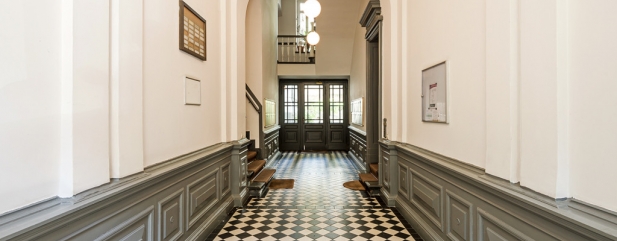Archived article
Please note that tax, investment, pension and ISA rules can change and the information and any views contained in this article may now be inaccurate.
Is there more to come from top performer Phoenix Spree?

The adviser to German residential property investor Phoenix Spree Deutschland (PSDL) notes average property prices in the capital city of Europe’s largest economy are lower than those
in Warsaw.
PMM Partners director Mike Hilton uses this astonishing fact to illustrate the potential opportunity still in front of the fund in Berlin despite an exceptional 2017.
Last year saw its portfolio increase in value by nearly 30% and its shares advance nearly 60%. This made it one of the top performing investment trusts of the year.
WHY BERLIN?
Partly due to its colourful history, that less than 30 years ago saw two halves of the city separated by a 13 feet high wall, Berlin has not developed like most other capital cities in the developed world but in Hilton’s view that is beginning to change.
Founded in 2007, Phoenix Spree is a long-term investor in mid-market German residential properties. It listed on the London Stock Exchange in 2015. The company focuses on apartment buildings where it can create value by modernising and renovating individual flats.
Most of the buildings it owns are more than 70 years old and they often require significant investment to bring them up to modern standards.
A single apartment generally costs between €20,000 and €30,000 to renovate, while an entire building renovation might cost up to €2m.
By renovating properties, Phoenix can push through rent increases in a tightly regulated market. The German rental market is very different from the UK and tenants have several protections not enjoyed by their counterparts here. Evictions are rare. Some people even hold on to tenancies for life.
Once a tenant is in place they are protected from rental increases and more recent legislation has also limited the scope to increase rent for new tenants too, although arguably ‘less successfully’ in Hilton’s view.
The controls on this market mean you can have two identical apartments in the same building and yet a four-fold difference in the rent that is paid, according to Hilton.
MICRO-MANAGING THE PORTFOLIO
As a result, Hilton argues assets must be micro-managed in a way that a portfolio of private rental properties in Manchester, for example, wouldn’t have to be. Or, in other words, he and his team work hard to earn their lofty ongoing charge of nearly 7%.
‘Historically there’s been very little construction activity in the Berlin residential market and with growing demand for apartments there is now a gap between supply and demand,’ Hilton says. ‘Demand is around twice the level of supply.’
He adds that, amid an inflow of young professionals working in several burgeoning new industries, this has been reflected in rising rents and falling vacancy rates. According to Hilton these dynamics are expected to persist for several years to come.
The rent controls also mean there is in Hilton’s words ‘considerable embedded growth in the portfolio’. Typically, there is a 35% to 45% gap between the rents existing tenants are paying and the rents achieved on a new lease. Tenants leave on average every seven or eight years and when they do the unit can be re-let at the market level.
A VIRTUOUS CIRCLE
Over time this creates a virtuous circle for Phoenix Spree. Properties within the portfolio are revalued on an annual basis. Increased rental income is reflected in higher property values which allows the cash spent on renovations to be balanced out by increased bank lending and reinvested into the portfolio.
Low interest rates also mean borrowing costs are very low, reducing from more than 5% when the business was started a decade ago to less than 2% today.
Recently the trust’s holdings were trimmed as positions in other German cities were exited. Hilton says the fund doesn’t have the scale to adopt a pan-German approach.
Sensibly the team didn’t advertise the fact its assets in cities like Bremen and Hannover were non-core so as not to undermine their negotiating position and the trust pocketed €73m from a sale of 34 properties announced in December 2017.
These funds can be reinvested in the Berlin market which now represents more than 99% of the portfolio by value.
REGULATORY CHALLENGES
Hilton concedes there may be further changes to the regulatory backdrop which could impact returns and says this is the ‘biggest challenge’ for landlords.
However, he argues the authorities must ‘walk a middle ground’ in order to provide incentives to invest in property and thereby ensure a consistent supply of decent quality accommodation.
Phoenix Spree also operates a lucrative side-line in so-called condominium projects where apartment blocks are sub-divided and sold as single apartments.
Anyone considering an investment in Phoenix Spree should note that its shares at 368p are trading on a very high premium of 26.6% to net asset value. (TS)
Important information:
These articles are provided by Shares magazine which is published by AJ Bell Media, a part of AJ Bell. Shares is not written by AJ Bell.
Shares is provided for your general information and use and is not a personal recommendation to invest. It is not intended to be relied upon by you in making or not making any investment decisions. The investments referred to in these articles will not be suitable for all investors. If in doubt please seek appropriate independent financial advice.
Investors acting on the information in these articles do so at their own risk and AJ Bell Media and its staff do not accept liability for losses suffered by investors as a result of their investment decisions.

 magazine
magazine










